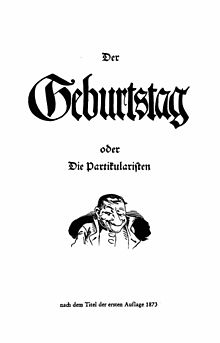The birthday or the particularists
The birthday or the particularists is a picture story by the humorous draftsman and poet Wilhelm Busch . The story was published by Bassermann Verlag in 1873 .
background
The 1870s are one of the most productive years in Wilhelm Busch's work. In particular in 1872 he published several picture stories. The pious Helene (1872) was again a great success after St. Anthony of Padua . The story is the second of the anti-clerical writings in Wilhelm Busch's work and the sensation that Der Heilige Antonius caused - among other things, the publisher Moritz Schauenburg was accused by the Offenburg public prosecutor for publishing indecent writings - again a great sales success, which this time was unmolested by the censors stayed. With their satirical exaggeration of piety and hypocritical double standards, both picture stories go beyond the historical context. Wilhelm Busch's publisher Otto Friedrich Bassermann encouraged his author to comment more on current political events than before. Wilhelm Busch then wrote Father Filucius , who is considered the weakest of the anti-clerical stories of Wilhelm Busch and which he himself later referred to self-critically as an allegorical mayfly .
Wilhelm Busch renounced further stories with a political reference to the day and in 1872 he published pictures of the Jobsiade , a picture story based on the Jobsiade of the Bochum doctor Carl Arnold Kortum . In the same year he worked on the picture story The Birthday or the Particularists , a picture story that is also further removed from current events. In Wilhelm Busch's work there is a story written for the Fliegende Blätter that is a little younger and bears the name The Partikularist . Against the background of the Franco-Prussian War of 1870/71, he pokes fun at the anti -Prussian sentiments of a farmer who cannot imagine a Germany under the leadership of Prussia. The figure portrayed as a prototypically German person takes the side of the French and enjoys every victory that the French can win over the Prussians. With each victory of the Prussians, however, he increasingly turns into a donkey.
content
The birthday or the particularists take up the story of the particularist and develop it a little further. It is a hit and comedy by a bunch of Lower Saxon villagers who want to give their exiled King George V a birthday present. Like the particularist, it is thus a mockery of local patriotism, as represented, for example, by the German-Hanoverian Party , which did not want to get used to the fact that the Kingdom of Hanover had become a Prussian province in 1866. However, the villagers fail miserably in making and sending the birthday present, because they not only suffer all sorts of mishaps, but also always want to convert the festive making of the present into their own advantage. It is thus a predominantly humorous work in which political satire takes a back seat in favor of amusement at peasant cunning.
classification
The birthday or the particularists are occasionally used to prove how apolitical Wilhelm Busch was. Father Filucius is not the only tendency piece in Wilhelm Busch's work. During the siege of 1870, he wrote a picture story with Monsieur Jacques à Paris that relates to current events. The Busch biographer Michaela Diers describes this picture story as a “ tasteless work that serves anti-French affects and makes fun of the plight of the French in their capital besieged by the Prussian troops ”. It shows an increasingly desperate French citizen who, during the German siege of Paris, first ate a mouse as “domestic venison”, then amputated the tail of his dog to cook it and finally invented an “explosion pill” that was his first Dog and then killing two of his fellow citizens. Eva Weissweiler points out, however, that Wilhelm Busch dealt ironic blows on all sides in his stories. With Eginhard and Emma (1864), a fictional family episode from the life of Charlemagne , he ridiculed the enthusiastic call for a German Empire based on the foundations of the Holy Roman Empire and courtly Catholicism; In The Birthday or the Particularists he ironized the fanatically anti-Prussian sentiments of his Hanoverian compatriots.
supporting documents
literature
- Michaela Diers: Wilhelm Busch, life and work. dtv 2008, ISBN 978-3-423-34452-4
- Joseph Kraus: Wilhelm Busch. Rowohlt, Reinbek 1970 (16th edition 9/2004), ISBN 3-499-50163-5
- Gudrun Schury: I wish I were an Eskimo. The life of Wilhelm Busch. Biography . Aufbau-Verlag, Berlin 2007, ISBN 978-3-351-02653-0
- Gert Ueding : Wilhelm Busch. The 19th century in miniature ; Insel, Frankfurt / M. 1977; New edition 2007
- Eva Weissweiler: Wilhelm Busch. The laughing pessimist. A biography . Kiepenheuer & Witsch, Cologne 2007, ISBN 978-3-462-03930-6



